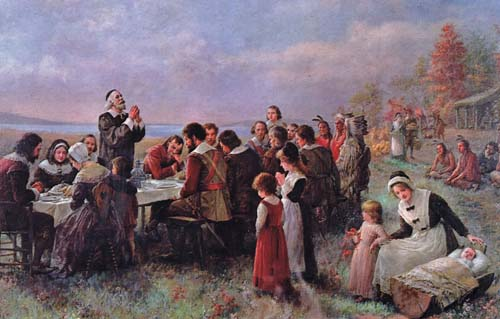
After reading Psalm II from the Bay Psalm Book, I decided to do a little research on the book because I was a tad confused. I had to reread the psalm several times and learn a little about its publication (printed in 1640 in Cambridge, Mass., so just a little after the arrival of the first Pilgrims) before I could make enough sense about it. Once I got some background, though, the horrific spelling and strange syntax made a lot more sense.
What would the early Pilgrims think about this psalm, and how did it relate to their life in the New World? Well, I'm no pilgrim, but I'll try my best to see how they would interpret this psalm and its meaning in early America.
First, I think the psalm has a strong sense of community within its text, a sort of 'us' versus 'them' theme. Maybe I'm reading too much into it, but because it was a tough life for the first pilgrims, and because so many of them left to escape religious persecution, the psalm takes on a righteous quality. That is, they would interpret the psalm as a justification for leaving the Old World...breaking away from corrupt kings and evil governments to find truth through God's word. The pilgrims revere and fear God like the speaker of psalm, whereas the Kings and Princes in the psalm are similar to the wrongful leaders of the Old World. The pilgrims need not fear their new life, for they have escaped evil and can now follow the way of the Lord.
I also think the rhythm and rhyme scheme adds to the communal feel of the psalm. Because the psalm would be sung, it would draw people together and strengthen their justification for going to America. They would listen to the 'lesson' of the psalm and follow God's way, viewing it through eyes of pilgrimage and new hope.
 Read the Bay Psalm Book here, without the 's's looking like f's!
Read the Bay Psalm Book here, without the 's's looking like f's!http://www.cgmusic.com/workshop/baypsalm_frame.htm

I think it is interesting to ponder the community that this Psalm -- or the Psalms in general -- may have brought to the early European Americans. They were strangers in a strange land and, as we discussed in class, they likened themselves to the Psalmwriters and grouped themselves together as a sort of 'us against the world' people. Good points!
ReplyDelete